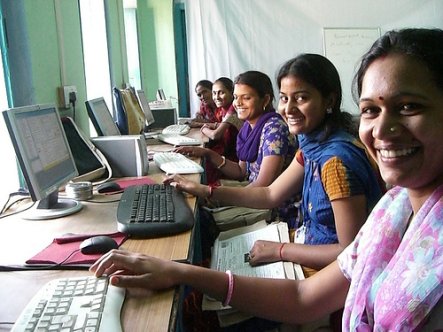Social entrepreneurship is the new fair trade, or at least one would think so by the way the term has been bandied about in non-profit and philanthropic circles in recent years.
While at first glance "social entrepreneurship" seems to be just another euphemism for the Twitters and Facebooks out there, the actual meaning would appear to be the ultimate contradiction. Is it really possible to run a successful business enterprise that also helps people in need? Moreover one that circumvents or even outright ignores the rules set by stodgy economists in order to create sustainable growth for those who need it most?
The founder and CEO of Bay Area-based non-profit Samasource, 26-year-old Leila Chirayath Janah, certainly thinks so. Samasource seeks to bring meaningful, dignified tech work to people in some of the poorest and most remote parts of the world. Janah is at the vanguard of this growing movement, and although Samasource itself is a toddler in human years, the impetus for founding it came about a decade ago when Janah was a high school student.
Growing up in a working-class suburb of Los Angeles to parents who valued education, Janah earned a scholarship from a tobacco company. Despite the monetary help this would provide, Janah was overwhelmed by guilt due to the source of the funds. But rather than just taking the money and quietly gnashing her teeth in the background, she did what she's continued to do since: come up with an innovative solution to the problem at hand. She convinced her school to allow her to graduate early and used the scholarship to spend her senior year teaching at the Akropong School For the Blind in Ghana, the first of its kind in West Africa.
It was in Ghana that Janah says she was exposed to what she viewed as the biggest problem stemming from poverty, "wasted talent. Because of an accident of birth they don't have the same opportunities that many in the West do. If one of them got out it was a miracle."
Janah went on to earn a BA in African Development from Harvard, though she became progressively disillusioned with the development sector as she saw a lot of organizations lose focus on what was ostensibly their primary goal of increasing people's income over the poverty line. The bulk of the development programs Janah encountered aimed to accomplish this via indirect means such as building roads.
She had other ideas. Janah sought to find a way that directly impacted and increased poor people's incomes as well as their access to economic opportunities.
The lightbulb moment came when Janah was working for a management consulting firm in New York City ("I wanted to learn more about social enterprise and thought it would help me learn to apply business thinking into the social sector") and was sent to Mumbai to work with an outsourcing company. It was then she realized she didn't want to work with a large development agency, but also came to the realization that tech jobs, and their ease of facilitation across borders, could potentially be a long-term feasible and sustainable way to alleviate poverty.
Janah contrasts this concept with the booming fair trade trend by pointing out that "handicrafts and trade are a great idea but the challenge is getting the goods across borders and through customs. With digital services there are no transfer costs. You don't need good roads or expensive trucks for shipping, no friend on the inside who works for customs. It happens instantly and completely freely, which is really powerful."
Once the idea struck, implementing it came with its share of initial problems and false starts. The first incarnation of Samasource was a fair trade market for services. Funders weren't convinced. There was also the issue of differentiating Samasource from all the other players in the Bay Area start-up game. Janah chose to tackle the question of how one can measure social impact within the context of the work they were doing. She believed that even if poor people were being hired, it wouldn't be contributing to economic development if they didn't own a majority of that company.
"What we don't want is a multinational with a branch in Kenya where the bulk of the profits don't stay in Kenya," says Janah.
Soon they came to the realization that a more effective way to help Samasource's target beneficiaries was to adopt service partners such as locally owned tech businesses and non-profits, then finding the infrastructure and incubating it all. Service partners in some of the poorest parts of the world began receiving a five-week training program developed by a team at Stanford Law School, upon completion of which they were ready to find paid work in Silicon Valley.
As Samasource sharpened their vision through trial, error and innovation, the first signs of impact were beginning to show. Janah is proud of her first sale, made when Benetech agreed to use proofreading services out of Nairobi. The Nairobi firm was headed by a 27-year-old man who fought and struggled to receive an education and also made a concerted effort to hire women. Once Benetech agreed to work with Samasource, other firms caught on which led to over $100,000 in revenue for the Nairobi firm.
Yet it wasn't until the day a Western Union payment in the amount of $850 was sent to Maria Umar in Pakistan for a month's work that Janah saw the full force of possibility Samasource was helping to bring about for individuals. Prior to this Maria was earning less than $100 a month. She's an educated stay-at-home mother living in a Taliban-controlled part of Pakistan who was unable to earn a living outside her home. Within just a few months of connecting with Samasource, Maria not only increased her income more than eightfold, but she also went on to start her own firm to help other women like herself empower themselves while still living under a regime that is widely considered among the most oppressive to women.
It was during this time Janah saw firsthand the challenges of founding a non-profit during one of the worst economic crises in generations. In order to found Samasource she had given up her cushy management consulting job and her apartment in Manhattan to couch-surf and live off of $400 a month in San Francisco, one of the most expensive cities in the world. Yet she doesn't recommend this path to others who might hold romanticized ideals of what it is to start a social enterprise. "It was scary with no sense of financial certainty. My parents aren't wealthy. I was lucky and had friends who treated me to meals sometimes."
Apart from Janah's personal finances, finding donors was a challenge also as it was difficult convincing them that outsourcing was a way to develop a sustainable economic model. Samasource was re-branded to also include refugee camps, in addition to their already established model of helping women and youth and connecting them all to meaningful work, not solely the standard outsourcing tasks.
In addition to the angel investors that have come on board, Samasource was recently honored with a $65,000 grant from the Rockefeller Foundation to support their budding refugee work program. Silicon Valley power players such as Facebook began to take notice and Samasource was a finalist in the Facebook Fund competition, which gave Samasource office space, funding, and professional guidance.
Most who have heard of Samasource's refugee program have been most moved by Paul's story. To Janah, Paul is emblematic of the potential Samasource is working to bring forth. "Paul was invisible in the world before, now he has a voice. An online presence is the currency of our digital world. We're also building social capital through their online reputations with social networks."
Paul was one of the "lost boys" of Sudan, fleeing the country when he was only ten years old to escape a brutal civil war. After being shot in the stomach and suffering a paralyzed leg while in a Kenyan refugee camp at 14, he was moved to Dadaab's Ifo camp. In his time there he has learned English and is among the first participants in the Samasource refugee work program. When Janah was introducing Paul to small tasks, she asked him to go to the University of Maine's site as part of one. When browsing the site, Paul saw another of Sudan's lost boys, one who had been granted asylum and received a scholarship to the university. It was a powerful moment for both Paul and Janah.
So many of us have heard the grim statistics of how the majority of people living in developing countries struggle to eke out a living on just a dollar a day and the tragedies that can result from such desperate circumstances, particularly for women and children. Among Samasource's more innovative aspects are bypassing governments and going directly to individuals and giving them options. It also contributes to the vitality of smaller communities by keeping skilled, meaningful jobs within those communities rather than creating a brain drain of workers leaving for larger cities, moreover it gives work to those who simply can't or won't leave their communities.
Despite some of the monumental obstacles Janah has to overcome, she remains optimistic as Samasource continues to grow. She enjoys being a role model for women in the tech field and notes that while she's often the only woman who is a founder on the many panels she's invited to, she doesn't view the tech world as having gender or racial biases. Rather she has encountered people who want to nurture women. While Janah mentions encountering the occasional dismissive attitude due to her youth, she views the technology field as a meritocracy. "If you can code they don't care about your race or gender."
Tech meritocracies notwithstanding, there have been some grumblings about how social entrepreneurship is solely the province of those who are already privileged, but Janah is proof this isn't necessarily so. While her Harvard education certainly has associations to monetary privilege, she did not fit the mold of what one assumes is a typical Harvard undergraduate. "I've worked since I was 13 and still have a huge debt from Harvard. I've scrubbed toilets. For a lower-income kid from LA, you need to have a backer and that often requires social capital." She was able to cultivate the social capital that helped to launch Samasource while at Harvard through her own persistence. "Some of the most famous social entrepreneurs are dirt poor from developing countries and have a vision. They don't quit and that has nothing to do with privilege."
As Samasource begins to make the impact Janah set out to make, plans continue for careful growth and expansion, including in Mississippi, the poorest state in the U.S. An iPhone app called Give Work is currently in development in conjunction with Dolores Labs. Samasource is also working on a Facebook application that allows application developers to outsource their app testing to Samasource beneficiaries, primarily in Zambia.
Janah looks to author Mohammed Yunus for inspiration when she envisions the future of social entrepreneurship. Yunus wrote about the societal norm of measuring success as personal wealth, rather than the positive feelings incurred from helping others. Indeed, Janah says she "was so much happier making $400 a month than in my New York City consulting job and fancy apartment. I think there will be a lot more people like that emerging over the next decade."
For more information on the work of Samasource, visit their website here.














